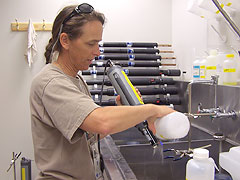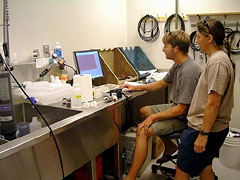

 | |||||||||||||
|
|
Journals 2005/2006Sarah Mitchell
July 1, 2005 Today was spent inside the lab which worked out fine as the heat index was 105 degrees. Some of the day involved helping the team relocate to their new location, as construction on the new MRI building at Hollings required they vacate their current office area. Most of the day was spent calibrating the monitoring equipment that will be deployed next week. Anne Blaire was very patient with me here, and allowed me pick her brain and get some hands on experience. The YSI sonde equipment is linked directly to a computer which provides immediate readings and record of data from the various probes. I'm not sure if all sondes collect the same data, but these are set up to measure temperature, depth, salinity, dissolved oxygen, pH and chlorophyll. Working one probe at a time, each was selected on the computer, then washed, seasoned, and then placed in a known quantity of whatever it was testing. Calibration is done to give assurance to the quality of the data that will be collected.
After this I had a period of "down time" which gave me an opportunity to explore more of the Hollings Lab. Everyone I spoke with was very helpful and seemed willing to share information on their position and associated research. It is very interesting and encouraging to see people from so many agencies working together here. One of the people I spoke with was a graduate student who was running an experiment on the reaction of coral to heat stress. In addition to asking about the specifics of the study, I asked her what advice she would offer to students interested in pursuing a career in science. Her response echoed advice I have been hearing from many of the scientists. In addition to studying and getting a degree, a consistent response has been that students should try to plan some type of internship or volunteer work in a lab. Showing a willingness and the potential to learn is huge. Getting to know people in the field and actual work being done is huge. As I mentioned, the advancement and use of technology is definitely seen in many of these labs and much of the equipment is either too new or too expensive to be found in most schools. Showing a willingness and ability to learn new skills is in many cases more important than class grades. Finally, the other piece of advice I heard repeatedly was learn how to work together. Any more, it seems that the norm is not to work alone in a lab, but rather to be on a team where interactive social skills are continuously used. |
||||||||||||

